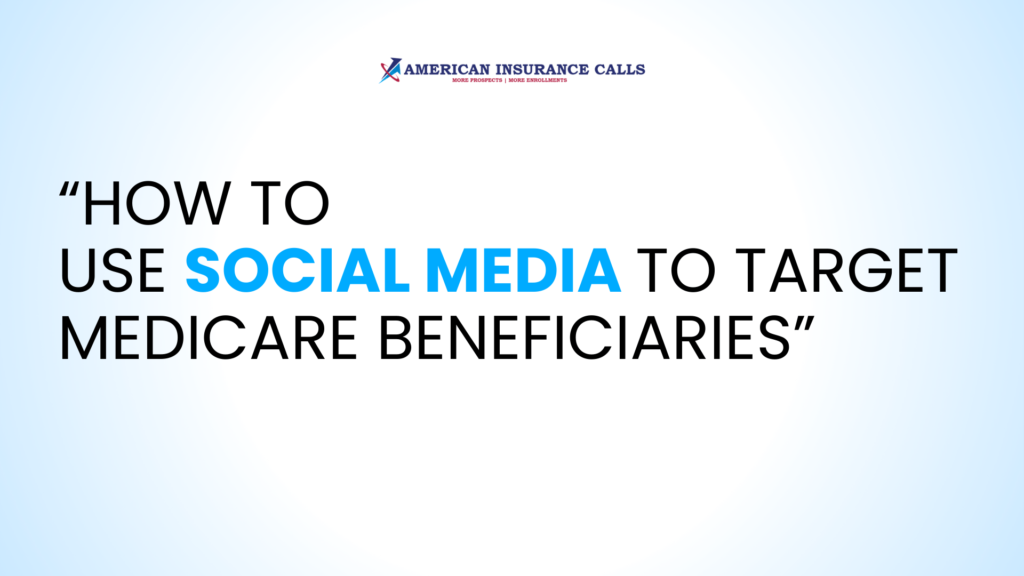Social media has become a powerful tool for businesses across all industries, including insurance. With millions of Medicare beneficiaries and their caregivers using platforms like Facebook, YouTube, and LinkedIn, social media offers an unparalleled opportunity to connect with this audience. However, effectively targeting Medicare beneficiaries requires a thoughtful approach that combines compliance, education, and engagement.
In this article, we’ll explore how to use social media to target Medicare beneficiaries, the best practices for crafting your campaigns, and strategies to generate high-quality leads.
Why Social Media is Effective for Reaching Medicare Beneficiaries
The stereotype that seniors are not active on social media is outdated. A significant portion of adults aged 65 and older regularly use social media platforms, making it a valuable channel for reaching Medicare beneficiaries.
Key Statistics:
- Facebook Usage: About 50% of adults aged 65+ are active on Facebook, making it the most popular platform among seniors.
- YouTube Engagement: Many seniors turn to YouTube for informational and educational content.
- LinkedIn for Caregivers: Caregivers, often involved in Medicare decision-making, are highly active on LinkedIn.
Social media platforms allow insurance agents to:
- Educate prospects about Medicare options.
- Build trust through consistent engagement.
- Generate leads by offering valuable information and resources.
Choosing the Right Platforms
1. Facebook
Facebook is the most effective platform for targeting Medicare beneficiaries due to its large senior audience. Key features include:
- Facebook Ads: Target specific demographics, such as age, location, and interests.
- Groups and Communities: Join or create groups focused on senior health and Medicare discussions.
- Content Sharing: Post articles, videos, and infographics about Medicare plans.
2. YouTube
YouTube is a powerful tool for sharing educational videos that explain Medicare plans and benefits. Video content is engaging, easy to consume, and effective in building trust.
3. LinkedIn
While LinkedIn isn’t typically used by seniors, it’s a great platform for reaching caregivers and healthcare professionals involved in Medicare decision-making.
4. Instagram
Instagram can be used to share visually appealing content, such as infographics and testimonials, targeting a slightly younger audience, like caregivers and pre-retirees.
Strategies for Using Social Media to Target Medicare Beneficiaries
1. Leverage Targeted Advertising
Social media advertising allows you to reach a highly specific audience. Platforms like Facebook and YouTube offer detailed targeting options, enabling you to focus on:
- Age: 65+ or pre-retirees aged 60-64.
- Location: Target beneficiaries in specific geographic areas.
- Interests: Healthcare, retirement planning, or senior wellness.
- Behaviors: Users actively searching for Medicare-related information.
Use compelling ad copy and clear calls-to-action (CTAs) like:
- “Call Now for a Free Medicare Consultation.”
- “Learn How to Save on Your Medicare Plan.”
2. Share Educational Content
Educating Medicare beneficiaries is one of the most effective ways to build trust and engagement. Create content that answers common questions, such as:
- “What is Medicare Advantage?”
- “How Does Medigap Fill Gaps in Original Medicare?”
- “Top 5 Benefits of Medicare Part D.”
Types of content to consider:
- Blog Links: Share blog posts from your website on Facebook and LinkedIn.
- Videos: Post explainer videos on YouTube and Facebook.
- Infographics: Create visually appealing graphics that simplify complex Medicare topics.
3. Host Live Q&A Sessions
Live video sessions on Facebook or YouTube are an excellent way to interact with Medicare beneficiaries in real-time. Answer their questions, explain enrollment periods, and provide insights into different plan options.
4. Engage with Medicare Groups
Join Facebook groups or create your own community focused on Medicare education and resources. Actively participate by:
- Answering questions from group members.
- Sharing helpful content.
- Hosting polls or surveys to understand their concerns.
This approach positions you as a trusted advisor while building a network of potential leads.
5. Highlight Testimonials and Success Stories
Social proof builds credibility. Share stories of satisfied clients who found the right Medicare plan with your help. Use testimonials in:
- Facebook posts.
- Instagram stories or reels.
- Short YouTube videos.
6. Promote Free Resources
Offer free resources to attract Medicare beneficiaries, such as:
- Downloadable guides (e.g., “The Ultimate Guide to Medicare Enrollment”).
- Free plan comparison tools.
- Webinars on Medicare options.
Use these resources as lead magnets to collect contact information for follow-ups.
7. Stay Compliant
Medicare advertising is heavily regulated, and social media campaigns must adhere to CMS guidelines. Key compliance points include:
- Avoid making false or misleading claims.
- Include disclaimers like, “We do not offer every plan available in your area.”
- Ensure all advertising materials are CMS-approved.
Measuring Success on Social Media
Tracking performance is essential to ensure your efforts are effective. Key metrics to monitor include:
- Engagement Rates: Likes, comments, shares, and clicks.
- Lead Generation: Number of inquiries or contact forms submitted through social campaigns.
- Cost Per Lead (CPL): Evaluate the efficiency of your paid campaigns.
- Reach and Impressions: Number of users exposed to your content.
Use these insights to refine your campaigns and improve ROI.
Best Practices for Social Media Success
- Be Consistent: Post regularly to stay top-of-mind with your audience.
- Use Clear CTAs: Encourage users to take specific actions, such as calling your office or visiting your website.
- Test and Optimize: Experiment with different ad copy, visuals, and targeting options to identify what works best.
- Engage Responsively: Reply to comments, messages, and questions promptly to build trust.
- Leverage Video Content: Videos are one of the most engaging forms of content, especially for explaining complex topics.
Conclusion
Social media offers a unique opportunity to connect with Medicare beneficiaries and their caregivers. By leveraging targeted advertising, educational content, and interactive engagement, insurance agents can position themselves as trusted advisors and generate high-quality leads.
When used strategically and compliantly, platforms like Facebook, YouTube, and LinkedIn can become powerful tools in your Medicare marketing toolkit. Start implementing these strategies today to grow your audience, boost engagement, and drive conversions in this competitive market.

